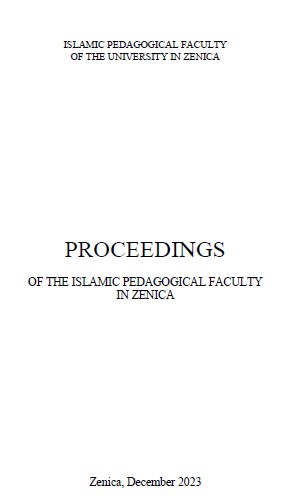UZRITSKI MOTIVI LJUBAVI I LJUBAVNE ČEŽNJE KOD BOŠNJAČKIH I SRPSKIH ROMANTIČARA
UZRIT MOTIFS OF LOVE AND LOVE LONGING IN BOSNIAK AND SERBIAN ROMANTICISTS
Author(s): Semir RebronjaSubject(s): Customs / Folklore, Comparative Study of Literature, Bosnian Literature, Serbian Literature, Theory of Literature
Published by: Islamski pedagoški fakultet Univerziteta u Zenici
Keywords: comparative literature; Uzrit poetry; romanticism; Safvet-beg Bašagić; Laza Kostić;
Summary/Abstract: Created in the 7th century, Uzrit love poetry or desert love poetry is inspired by love. It is named after the tribe to which poet Džemil (Ğamīl), one of the most famous love poets, belonged. In these poems, a lover spends his whole life in longing and absence, yearning for his beloved one. At the end of the 19th and the beginning of the 20th century, European romanticists sang and composed songs following, among others, Uzrit poets. Thus, Heinrich Heine sang the song Der Azra, writing down the Arab tradition of the Banu ʻUzra (Banū ʻUḏra) tribe that "for love lose their heads and die when they kiss". Hajne also influenced romanticists, such as Bašagić and Kostić. We can assume that Bašagić was directly influenced by the Arab love poetry of the desert because he knew the Arabic language, studied at university, and translated numerous poems from the Arabic language. However, when it comes to Kostić, the influence was indirect. A factor that should not be excluded from the research on the influence of Uzrit love, as a phenomenon, on romanticism, but also on the entire literature of the Balkan peoples, is folk poetry, which is filled with motifs from the East, and especially the Uzrit understanding of love. We witness the unavoidable influence of numerous folk songs, which later grew into songs sung with musical instruments, sevdalinkas, which the poets of the Balkans, regardless of national-confessional affiliation were exposed to. That folk lyric sang about exactly what Uzrit poetry sang about and it often drew its motifs from the Uzrit understanding of love.
Journal: Zbornik radova Islamskog pedagoškog fakulteta u Zenici
- Issue Year: 2023
- Issue No: 21
- Page Range: 399-422
- Page Count: 24
- Language: Bosnian

